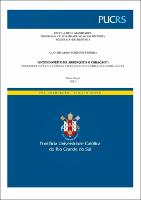| Share record |


|
Please use this identifier to cite or link to this item:
https://tede2.pucrs.br/tede2/handle/tede/10694| Document type: | Dissertação |
| Title: | “Antes do peito me arrenqueis o coração!” : representações da família escravizada na obra de Castro Alves |
| Author: | Pereira, Alan Ricardo Schimidt  |
| Advisor: | Murari, Luciana |
| Abstract (native): | Castro Alves é um dos poetas mais conhecidos do romantismo brasileiro nos dias atuais. Seu nome virou sinônimo de luta antiescravista e sua atuação no meio do abolicionismo, bem como as representações que fez dos escravizados, lhe renderam a alcunha de “O poeta dos escravos”. No presente trabalho partiremos do conceito de representações sociais de Roger Chartier (2002a; 2002b; 2002c), e de conceitos como o comover para convencer de Oliveira (2007) e retórica da mudança (ALONSO, 2015). A articulação dessas noções sendo realizada sobre a obra castroalvina nos auxiliará a compreender os motivos da representação social da família escravizada contida nesses textos, e os motivos que levaram o poeta a representar da forma como representou esse aspecto da escravidão. Nesse trabalho foi demonstrado se o poeta destoou ou não das representações escravistas e emancipacionistas dos oitocentos brasileiro a respeito da família cativa, e para tanto fizemos análises da vida de Castro Alves, da conjuntura social da escravidão e da família escravizada no Brasil Império, bem como das categorias retóricas que o poeta se utilizou para cooptar seu público à causa abolicionista, mantendo uma análise em aspecto comparativo entre a obra do poeta e as representações sociais feitas pelos demais grupos da sociedade imperial em textos e discursos que defendiam ou criticavam a escravidão. |
| Abstract (english): | Castro Alves is one of the most known poets of Brazilian romanticism in the present day. His name became a synonym for anti-slavery struggle and his activity within abolitionism, as well as the representations he made of the slaved, gave him the title of “O Poeta dos escravos”. The following work is based on Roger Chartier’s (2002a; 2002b; 2002c) concept of social representations, and concepts like Oliveira’s (2007) captivate to convince and rhetoric of change (ALONSO, 2015). Articulating these notions with Castro Alves’s work helps us to comprehend the motivation behind the social representation of the enslaved family present within these texts, and the reasons that made the poet represent that aspect of slavery the way he did. In this work it was demonstrated if the poet diverged or not from the slavery and abolitionist representations regarding the enslaved family that were present in 19th century Brazil. For that we was analyze the author’s life, the social context of slavery and the enslaved family in Imperial Brazil, as well as the rhetorical categories used by the poet to captivate his public for the abolitionist cause, maintaining a comparative analysis between the poet’s work and the social representations done by other groups of imperial society in text and speeches which endorsed or criticized slavery. |
| Keywords: | Castro Alves Representação Social Família Escravizada Escravidão História e Literatura Castro Alves Social Representation Enslaved Family Slavery History and Literature |
| CNPQ Knowledge Areas: | CIENCIAS HUMANAS::HISTORIA |
| Language: | por |
| Country: | Brasil |
| Publisher: | Pontifícia Universidade Católica do Rio Grande do Sul |
| Institution Acronym: | PUCRS |
| Department: | Escola de Humanidades |
| Program: | Programa de Pós-Graduação em História |
| Access type: | Acesso Aberto |
| Fulltext access restriction: | Trabalho não apresenta restrição para publicação |
| URI: | https://tede2.pucrs.br/tede2/handle/tede/10694 |
| Issue Date: | 3-Mar-2023 |
| Appears in Collections: | Programa de Pós-Graduação em História |
Files in This Item:
| File | Description | Size | Format | |
|---|---|---|---|---|
| ALAN_ RICARDO_ SCHIMIDT_ PEREIRA_DIS.pdf | ALAN_RICARDO_SCHIMIDT_PEREIRA_DIS | 1.83 MB | Adobe PDF |  Download/Open Preview |
Items in DSpace are protected by copyright, with all rights reserved, unless otherwise indicated.




